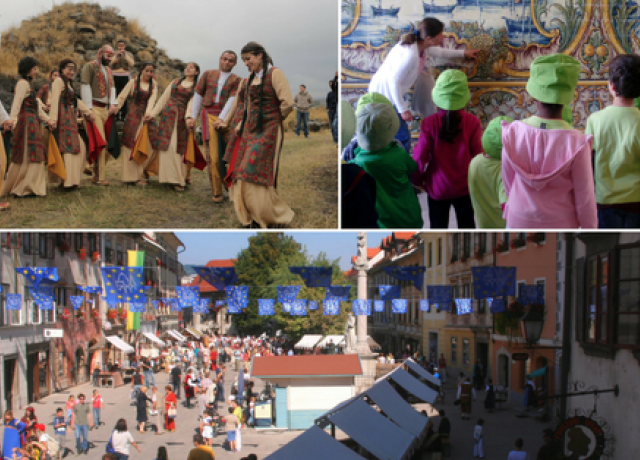European Heritage Days 2018: Celebrating the Art of Sharing
European Heritage Days 2018: Celebrating the Art of Sharing
---- download the press release in English ---
The European Heritage Days (EHDs), a joint initiative of the Council of Europe and the European Commission, are the most widely celebrated participatory cultural events shared by the citizens of Europe. The pan-European nature of this project contributes to bringing citizens together and highlighting the European dimension and the value of cultural heritage in the 50 signatory States of the European Cultural Convention. Over 70 000 events are organized every year in order to help raise awareness of Europe's common heritage and the continuous need for its protection, as well as to promote inclusiveness and foster creativity and imagination.
As one of the key initiatives of 2018’s European Year of Cultural Heritage, this year’s edition of the #EHDs is celebrating “The Art of Sharing.” The European Year of Cultural Heritage aims to encourage people to explore Europe's rich and diverse culture, to reflect upon and protect its unique value.
An extensive and varied programme, taking place from late August to October across the participating countries, will include interactive exhibitions, craft workshops, guided tours, festivals, treasure hunts and historical re-enactments, to name but a few. Many initiatives will explore the role of new digital technologies in the future of heritage and conservation.
The theme has inspired numerous exciting events exploring Europe’s significant places and histories. Visitors can participate in tours of the Lieu d’Europe in Strasbourg or the House of European History in Brussels. Events are taking place across the continent in celebration of this special year, from the Välimaa Sámi Farm on ancient fishing grounds by the River Teno, one of the northernmost settlements in Finland and the European Union, to an intercultural city tour led by migrant and refugee guides in Mouraria, Portugal.
There will be an opportunity to explore the forest of the Beaujolais hills in France through an exhibition, to be part of the Franciscan Fair in Opole, to go whale watching in Ireland, to discover a digital heritage festival in Ermoupolis, to see a street theatre performance exploring the history of peasant unrest in the ‘Sacred District’ of Ostrov, or to attend a special bike ride in Milton Keynes, celebrating women’s freedom.
“The European Heritage Days are a unique experience for celebrating cultural diversity and the colourful stories of a vibrant and diverse Europe. This cultural programme is a very effective tool to stimulate the imagination and promote true participation in cultural life. The Council of Europe is dedicated to its vision of raising awareness about culture as one of its shared fundamental values. This operation is just an example of a successful implementation of our European Cultural Convention, pioneering mutual understanding in our Continent and pursuing a common action designed to safeguard and encourage the development of a truly European culture. European Heritage Days are a practical way to enable people to explore what they have in common and what it means to belong to a common space”, said Gabriella Battaini-Dragoni, Deputy Secretary General of the Council of Europe.
“Cultural heritage is central to our identity as Europeans and has a vital role in driving social and economic development. The theme of this year's European Heritage Days, “The art of sharing”, is in essence what the European Year of Cultural Heritage 2018 is all about. The European Year will help reinforce a sense of belonging to a common European space. We have to use the momentum to keep culture and cultural heritage at the top of Europe's political agenda and at the heart of citizens' lives. Culture and cultural heritage have a unique power to bring together people from different backgrounds and enable them to understand and respect their differences – and to recognise their historical, cultural and human experiences they share. Through this, I hope people come to realise that there is more that unites us than divides us", said Tibor Navracsics, European Commissioner for Education, Culture, Youth and Sport.
Background
Celebrated in 50 signatory States to the European Cultural Convention, European Heritage Days highlight the diversity of local skills, traditions, architectural styles and works of art that constitute shared European Heritage. Launched by the Council of Europe in 1985 in France, the Days have been organised as a joint initiative of the European Commission and the Council of Europe since 1999. Enabling citizens to explore a wide range of cultural assets through a number of themed events, European Heritage Days help uncover histories of people and places that have contributed to shape the culture and heritage of Europe. The aim is to increase understanding of a shared European past, encourage appreciation of traditional values and inspire new heritage conservation and education practices. Cultural heritage has always been recognised as a priority by the Council of Europe. Moreover, it is now a pivotal theme under Creative Europe, the EU's programme for the cultural and creative sectors.
More information
European Heritage Days Portal: www.europeanheritagedays.com
Council of Europe: European Heritage Days
European Commission: European Heritage Days
Facebook: www.facebook.com/EHDays
Twitter: @JEP_EHD #EHDs#JEP2018
Instagram: @europeanheritagedays #EHDs #JEP2018
